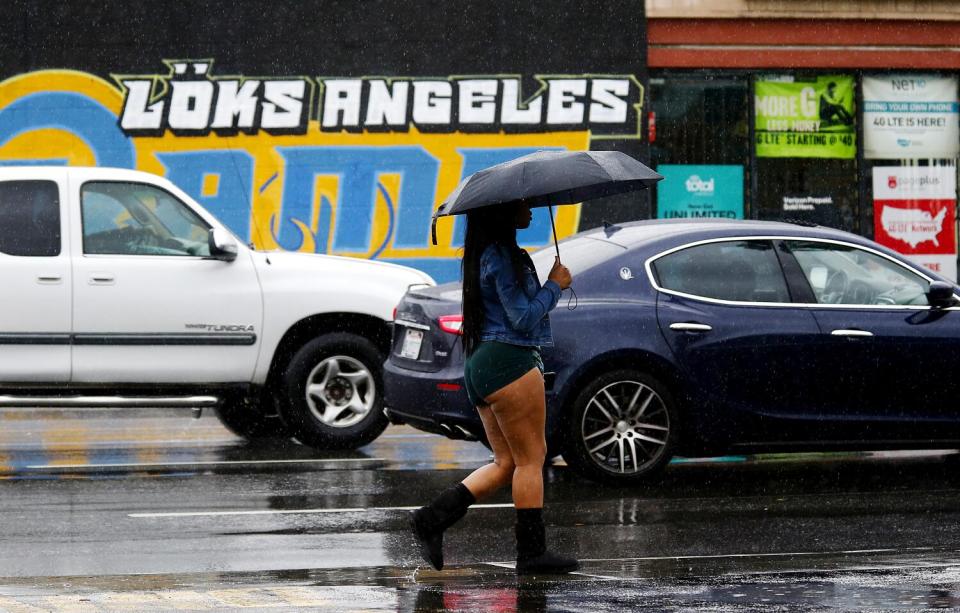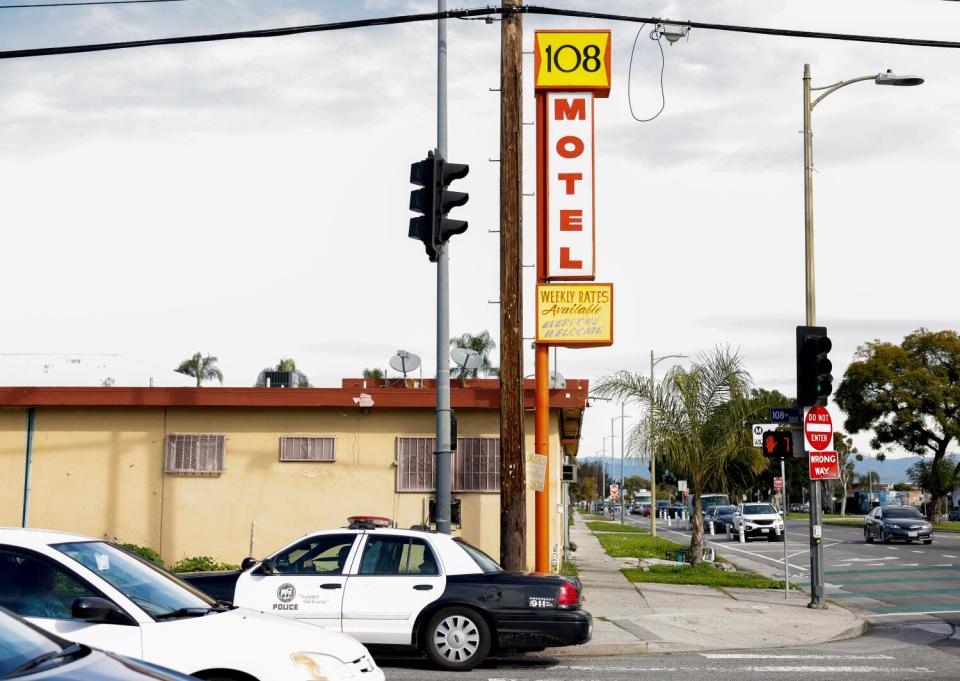Mother seeks answers after daughter, 20, murdered in L.A. sex work hub 'the blade'
As a self-described survivor of human trafficking who runs an organization dedicated to helping others affected by the crime, Debra Rush said she's heard the same story many times: A troubled young person flees home and ends up being forced into sex work and targeted with violence on the streets of Los Angeles.
Only Rush is now coping with a different version of the familiar tragedy — one where her own daughter is the victim.
Kendra Rush, 20, was shot to death nearly two weeks ago in a stretch of South L.A. known as a hub of the city's sex trade.
Police say Kendra was standing near the corner of Figueroa and West 70th streets when someone walked up and shot her in the head just after 4 a.m. on March 21. Bystander footage posted online showed a woman watching as paramedics performed CPR on the 20-year-old, a look of grave concern on the woman's face. Kendra was pronounced dead at the scene.
Her slaying occurred against a backdrop of broader debate over how to protect workers from violence, which has revealed cracks in the criminal justice reform movement. Some proponents of decriminalization say those who engage in the work of their own volition are being put further in harm's way by efforts to curb trafficking. Meanwhile, advocates for stronger intervention worry that the rollback of anti-loitering laws has limited the ability of law enforcement to go after those responsible for endangering workers' lives.
On Thursday, Los Angeles police announced the arrest of a 29-year-old man suspected of murdering a trans woman in the Vermont-Slauson area, another killing authorities have said they believe was linked to sex work. The suspect, Bryan Blackmon, is being held on $3 million bail, according to online jail records.
Rush, 44, said she had dedicated her life to stopping violence against sex workers even before her daughter’s death. The Fresno resident started a nonprofit in Central California’s San Joaquin Valley called Breaking the Chains, whose aim is to connect trafficking victims with housing, counseling and other services in hopes of helping them escape what Rush refers to as “the life.”
Rush got the news about Kendra as she boarded a flight home after traveling to Washington, D.C. She wept into the phone. The detectives investigating her daughter's death wouldn't tell her much. But she says they did tell her Kendra was likely being forced to sell sex by gang members who control a portion of Figueroa known as “the Blade,” extracting “rent” payments from workers there.
Dexter Navarro, an investigator with the LAPD’s South Bureau Homicide Division, said he couldn't comment on whether Kendra was being trafficked because the case is ongoing. Rush said that she is is hesitant to reveal too many details for fear of compromising the investigation. But, she feels certain about what happened to her daughter:
“The same people she thought would protect her, I know were the ones who killed her."
Growing up, Rush said, Kendra’s life revolved around painting, cheerleading and the English dramas and movies she used to binge in her free time. For a time in her teens she went through a phase where she “only spoke in a British accent,” her mother recalled. She graduated from high school at 16 and went to work at a local hospital as an environmental services aide.
Rush now sees painful reminders of her daughter's childhood everywhere. She broke down crying on Easter Sunday while making deviled eggs for her other children, something she said Kendra always insisted on doing herself.
“She would be waiting to fill the eggs … to make sure they were perfect,” Rush said.
Photos of Kendra often showed her flashing a broad smile. In one post on Instagram, she wore green scrubs as she made a peace sign. But Rush said the happy exterior hid a deep well of pain and struggles with mental health.
Mother and daughter both lived lives marked by recurring abuse and violence. Rush suspects some of her daughter’s issues were rooted in sexual abuse inflicted by a caretaker. She also recalled an incident at the height of the pandemic in 2020 where she said Kendra was the victim of a violent home invasion. Two suspects broke in while she was home alone and assaulted her.
“She was alone with them for 45 minutes, and I don’t want to go into details,” Rush said.
The suspects were later charged and Kendra testified at their trial, an agonizing experience that her mother said sent her on a downward spiral. Her daughter had also been diagnosed with bipolar disorder, which Rush said compounded her situation.
“That’s where we kind of lost Kendra,” her mother said.
Kendra began having violent outbursts and grew withdrawn, Rush said. No longer feeling safe in their home, Kendra left town earlier this year and ended up in L.A., Rush said.
“She didn’t feel safe in her own mind, she didn’t feel safe at home,” she said. “Whenever these kids have nowhere to go, no job, no nothing, it didn’t matter how much I talked to them.”
Kendra's father wasn’t around much when she was young, Rush said, and she was sometimes absent herself as she coped with PTSD that stemmed from her own experience of being “violently trafficked for several months" as a young adult.
Rush had been living in Fresno when she was kidnapped and forced to engage in sex work to pay back a drug debt her mother owed in the mid-2000s, she said. One of the areas her captors dropped her off was on Figueroa Street. She eventually ran away and found her way back to Fresno.
Afterward, she sought to understand the ways that traffickers prey on the vulnerabilities of their victims. She found that some who had recently gone through experiences similar to hers wanted to go back to their abusers. She learned that while some traffickers used force, or the threat of it, others employed more subtle methods: Paying for meals, buying new clothes and providing a friendly ear to young women who weren't used to being showered with attention. Over time, she said, their victims began feeling indebted.
Such psychological manipulation sometimes plays out over several months, she said.
In recent years, Rush began to make a name for herself in anti-trafficking circles. She talked about her program's mission during regular guest appearances on local TV news stations and was on a first-name basis with lawmakers in Sacramento and D.C. who were pushing for new anti-trafficking laws. She was also the subject of a book called “A Cry of the Heart" about her life.
She reminded Kendra of her own experience often, and the two had developed a "safety plan" if Kendra found herself in such a situation. They also had an understanding that Kendra would text her regularly to show that she wasn't in danger. The messages stopped in the days before her death.

Kendra’s shooting was the second in the span of 48 hours in Los Angeles involving victims who were thought to be engaged in sex work.
In the first case, a transgender woman was shot March 21 in the early-morning hours and her body dumped onto Hoover Avenue between Slauson Avenue and West 59th Street. Friends of the 24-year-old victim, who went by the name Meraxes, started a GoFundMe page to help raise money to cover the family’s funeral costs. A message sent to the fundraiser’s organizer was not immediately returned.
Meraxes wrote on her Instagram page that she worked as a makeup artist and lived in several cities across Southern California. Several people left condolences under her most recent post, with one writing, “I love you so much always and forever you’ll never be forgotten.” Another referred to her by her nickname, Chun Li, and wrote that she was “always such a beautiful soul to be around.”
Her death was at least the seventh homicide in the U.S. so far this year in which the victim was “transgender, nonbinary, and gender nonconforming,” according to the blog Pittsburgh Lesbian Correspondents, which documents violence against queer communities.
Surveillance camera footage from a bar across the street from where she was found showed the shadowy outline of someone getting out of a light-colored sedan and dragging the body into the street before driving away.
Investigators initially believed that she was shot in the car. The suspected gunman, Blackmon, is being held on $3 million bail, according to online jail records. Police said he was taken into custody March 29. His initial court date hasn't been set and it wasn't immediately clear whether he had an attorney.
The area around where Kendra died is normally busy with foot and vehicle traffic, meaning there may have been witnesses. Rush, whose organization sometimes works with law enforcement, said she hopes witnesses will come forward.
And yet, she said, fear of being caught cooperating with police scares some into silence.
According to the LAPD statistics, homicides citywide are up roughly 20% through the first three months of the year compared with the same time in 2023; the city ended last year with 327 slayings.

In the weeks since the killings of Kendra and Meraxes, police have stepped up their patrols in the area, including officers on horseback. Los Angeles city attorney Hydee Feldstein Soto has signaled her office will continue to aggressively prosecute traffickers, as well as taking on motel owners whose properties are magnets for illicit behavior.
Some advocates accuse law enforcement and politicians of overstating the human trafficking problem on Figueroa in order to justify more police crackdowns and the passage of harsher laws. Figueroa, these advocates argue, is like any given commercial sex corridor: a mix of people being forced or coerced into the high-risk work and those who are there by choice.
Advocates argue that recent attempts to address trafficking have only further endangered an already vulnerable group. For some, the work became even more of a lifeline during the pandemic as they struggled to support themselves or their families amid a growing shortage of affordable housing. Others, cut off from traditional support systems, have found community among their fellow sex workers.
In between fielding phone calls from well-wishers and picking out several paintings of Kendra’s to display at the memorial service, she flew down to L.A. to pick up her body and bring it home to Fresno.
She has struggled with whether she did enough to help Kendra. In a lengthy post on her Facebook page, she thought about the grim irony that she assumed others were also aware of: How did her daughter fall victim to sex trafficking even after a lifetime of warnings?
If nothing else, she wrote, Kendra's case proved that “anybody’s child” is vulnerable.
Despite the horrors they endure, some trafficking victims begin to form attachments to their abusers over time like a form of Stockholm Syndrome and begin to define their self-worth as “coming from people who purchase them” for sex, Rush said.

The same thing happened to her, Rush said, and she began to see signs of this so-called “trauma bonding” in her daughter.
Anyone with information about either case is asked to call South Bureau Homicide Division at 323-786-5100 or the after-hours number at 1-877-527-3247. Those who wish to remain anonymous can call Crime Stoppers at 800-222-8477.
This story originally appeared in Los Angeles Times.


